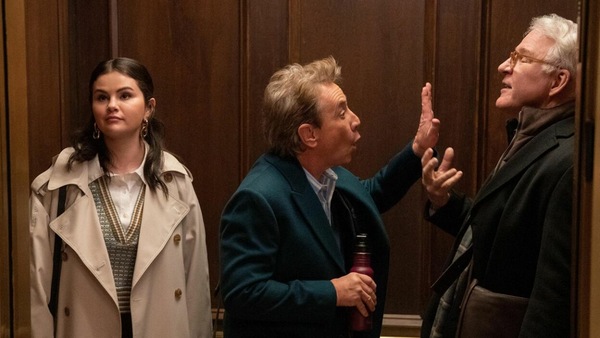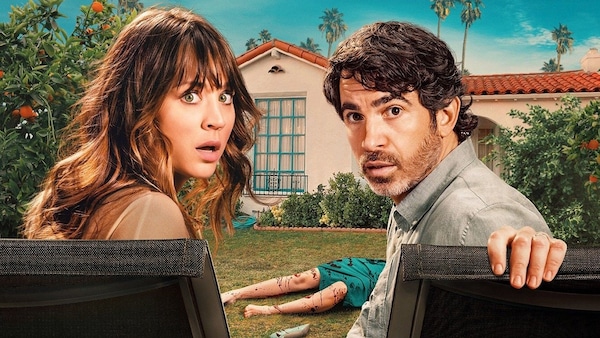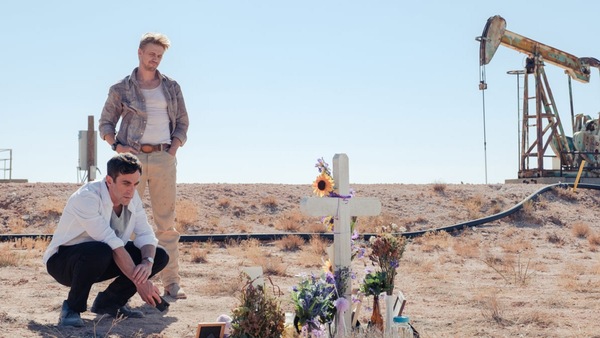'Based On A True Story': Mining Tragedy For Likes Is No Longer Kosher
Shows and films — like Only Murders In The Building, Based On A True Story and Vengeance — have turned the lens on our obsession with true crime podcasts, in a meta way. Manik Sharma writes.

Last Updated: 07.45 PM, Aug 18, 2023
“WHEN a civilisation collapses, only the tiniest fragments remain,” says Quentin Sellers, played by a deliciously wicked Ashton Kutcher, in a scene from the indie film Vengeance (2022). Sellers is a record producer, who has moved to Texas to record… not necessarily the next platinum-selling artist… but to sort of capture the fragmented truth of a country that is now identified through homologous markers of ‘virality’ and ‘genre’.
“Make recordings. Real people. Not what people think they already know and want to hear. Real people,” Sellers says, after being asked just how he would go about reclaiming an entire civilisation through its fragments. It’s a conversation that alludes to the booming culture of real-life documentation, specifically podcasts, through the lens of deprivation that has now — ironically — spawned an entire genre of storytelling.
As Only Murders In The Building has returned for its third season with a prestigious cast — Meryl Streep is part of the line-up — it’s worth evaluating how this inquiry into our true crime podcasting obsession began, and what it says about the nature of our interaction with media and murder.
The first season of Only Murders threw the lid open on our craven, at times insulting, obsession with death and morbidity. We like chasing click-bait, unruly headlines, with an appetite for visceral gore and twisty narratives. In Vengeance, directed by BJ Novak, a writer desperate for a good story goes all out to investigate the purported murder of a girl he once dated. Not out of some noble intention to suture torn threads but to simply find that juicy, conflicted ‘American Story’... a story that goes beyond human loss, into cultural decline, degradation etc. The culmination of this search, is of course, an online podcast. Contrary to the self-critical pathos of Vengeance, thrillers like Searching (2018) and Missing (2023) argue that documentation — when contextualised — can become an ally. But the desire to attach ourselves to someone else’s story is far more complicated than the simple act of historicising ordinary lives.

In the recently released Based on a True Story (Jio Cinema), a dysfunctional, down-on-their-luck couple sees a true crime podcast as a last resort to make a quick buck. Played by Kaley Cuoco and Chris Messina, this couple tries to mine their true crime fixation as the means to a selfish end. It’s a show that takes enthusiasm to the cusp of mania, quite simply by suggesting that our interest in death and crime no longer follows a sense of grief. Instead it trails fantasies, intrigue and this despicable idea to fulfil ourselves, through someone else’s vacuum. It’s hilarious, and disarming when packaged as a comedy but maybe the time is rife for that lens to become more self-serious.
In both Only Murders, Based on A True Story — and to an extent, Vengeance — people struggling to find themselves in life seek in the unravelling of a murder, a sense of purpose. None of it is based on the ideal of the common good, but on the primal sense of preserving your own sense of significance. In Only Murders, two old men in their decline team up with a young clueless woman to investigate not just crime, but the causality of their own disorientation.
“I’m 30 now and have no idea of what I want,” Mabel, played by Selena Gomez, says in the latest season. It’s the first time, in this now massive franchise, that a character feels lonely, without that impetus of crime around the corner. To contrast, Oliver (Martin Short) and Charles (Steve Martin), both have careers to recover and rejuvenate. Mabel instead symbolises that young generation that flickers into relevance because of the moment that social media represents, but also rapidly returns to anonymity because of the storied career or life it can never really replace.

Podcasting and similar forms of documentation have obviously democratised storytelling, wrested it from the control of big media. But what they have also done is inured people to the idea of undressing the wound without allowing it the space to heal. It’s a reactive quality that doesn’t just appear in the aftermath of a brutal loss, but also at the slightest hint of fracture. Injury is merely an excuse to seek perversions that can turn it into folklore. The desire therefore isn’t to solve anything, but to make it savoury. All for the narcissistic purpose of becoming part of something greater than yourself, as opposed to something shockingly grave and chilling that overwhelms you into feeling small and insignificant.
In Based on A True Story, this desperation to tell not just a story, but THE story, pushes a naïve couple into befriending the sociopathic killer. It raises a bigger question, however, about who the real sociopath is: the person who commits the murder, or the one who packages it for the sake of circulation. And by extension, as a definition of their self-worth. Thankfully, it’s a question that Only Murders in the Building looks set to contemplate.
